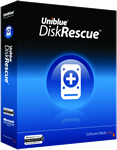|
|
 Defragmenting your hard drive occasionally is a simple but effective way to keep your system running at peak performance. You could leave Windows own defrag tool to handle the job, but it's slow, inefficient, and far from the best solution. The Windows Vista defrag utility won't even give you an estimate of how defragmented a drive might be (unless you use the command line version, anyway) - it's less convenient to use than the XP version. Defragmenting your hard drive occasionally is a simple but effective way to keep your system running at peak performance. You could leave Windows own defrag tool to handle the job, but it's slow, inefficient, and far from the best solution. The Windows Vista defrag utility won't even give you an estimate of how defragmented a drive might be (unless you use the command line version, anyway) - it's less convenient to use than the XP version.
Fortunately Uniblue DiskRescue 2009 takes a very different approach. Launch the program, click Start Scan and it'll run a quick analysis of your hard drive (and we mean quick, just a couple of minutes to scan 200 GB of data on our test PC). You'll then get a detailed report on your file system, including the number of fragmented files and the largest contiguous block of free space, so it's easy to figure out if a defrag session is needed.
If you decide to defrag the drive, then click one button and Uniblue DiskRescue 2009 will start optimising your file layout. It's a speedy process and so the best approach is just to leave your system alone for a while, let the program do its work, and it'll soon have your system running at full speed again.
The manual process only requires too clicks, but if that's still too much like hard work then you can always set up the scheduler to run defrags automatically. There are two options available. Choose the ongoing defragmentation and the program will kick in once your PC has been idle for 5 minutes. Or you can schedule the Uniblue DiskRescue 2009 to run on a particular time and day, even if you're not around.
|